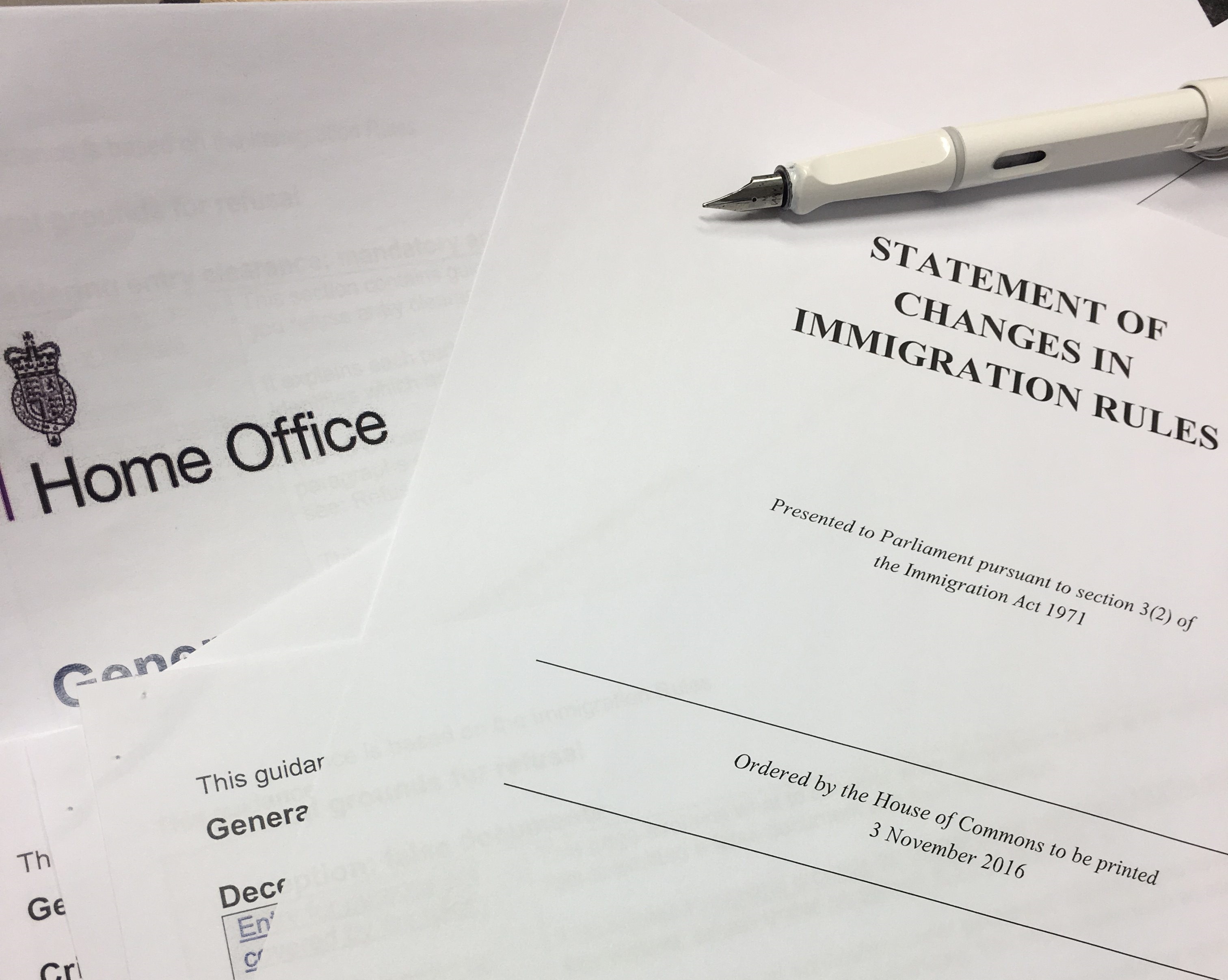UK Immigration Rules Tightened: Fluent English Now A Requirement

Table of Contents
Which Visas are Affected by the New English Language Rules?
The new English language requirements impact several key visa categories within the UK's points-based immigration system. Failing to meet these requirements will likely result in visa refusal. Let's examine some of the most affected visa types:
Skilled Worker Visa: The Skilled Worker visa, a popular route for skilled professionals, now mandates a specific level of English language proficiency as part of the points-based system. Applicants must achieve a minimum score in an approved English language test to gain the necessary points for their application. The required level depends on the specific occupation and skill level.
Family Visa: Individuals applying for a family visa, such as spouses or partners of UK citizens or settled persons, also face stricter English language requirements. This ensures that family members can integrate effectively into UK society. The required level might vary depending on the applicant's relationship to the sponsor.
Student Visa: Prospective students applying for a Student visa must demonstrate sufficient English language skills to succeed in their chosen course. The required level varies depending on the course's intensity and the educational institution. Universities and colleges usually specify the minimum English language scores accepted.
Other Visas: Other visa categories, such as the Investor Visa and the Innovator Visa, may also include English language requirements, though these might not always be as stringent as those for skilled worker or student visas. It's crucial to check the specific requirements for your chosen visa category.
- Specific Visa Categories and Minimum English Language Proficiency:
- Skilled Worker Visa: Usually requires at least B2 level (CEFR) in all four skills (reading, writing, listening, and speaking).
- Family Visa: Requirements vary but often involve a minimum of A1 or A2 level (CEFR).
- Student Visa: Varies greatly depending on the course; check with the educational institution.
- Exemptions: Limited exemptions might exist for certain applicants, such as those with disabilities or those from specific countries with English as an official language. However, these exceptions are rare and require significant evidence to support the claim.
What English Language Tests are Accepted?
The UK Visas and Immigration (UKVI) accepts several secure English language tests (SELTs) as proof of English language proficiency. These tests are rigorously standardized and recognized internationally. Here are some of the most common:
IELTS (International English Language Testing System): The IELTS is a widely accepted test assessing reading, writing, listening, and speaking skills. It offers both Academic and General Training modules, with the specific module requirement depending on the visa category.
TOEFL iBT (Test of English as a Foreign Language): The TOEFL iBT is another popular choice, conducted entirely online and widely accepted by UKVI. It evaluates reading, writing, listening, and speaking skills through integrated tasks.
PTE Academic (Pearson Test of English): PTE Academic is a computer-based test assessing English language proficiency across all four skills. It provides scores quickly and efficiently.
Other Approved Tests: While IELTS, TOEFL, and PTE Academic are the most common, UKVI may accept other approved tests. Always check the UKVI website for the most up-to-date list of approved tests before taking one.
- Links to Test Providers:
- IELTS:
- TOEFL iBT:
- PTE Academic:
- Minimum Scores: Minimum required scores vary significantly based on the visa category and the specific requirements of the sponsoring institution (for student visas). Always check the specific requirements for your visa type.
How to Prepare for the English Language Test
Preparing effectively for your chosen English language test is crucial for a successful visa application. Thorough preparation improves your chances of achieving the necessary score. Here's how to approach it:
Recommended Study Materials: Numerous resources can help you prepare, including textbooks specifically designed for IELTS, TOEFL, and PTE Academic, online practice tests, and language learning apps.
Practice Tests: Taking practice tests under timed conditions is essential. This helps identify areas for improvement and familiarize yourself with the test format.
English Language Courses: Consider enrolling in an intensive English language course or utilizing self-study programs focused on improving the skills tested. Many reputable language schools offer UKVI-approved preparation courses.
- Reputable Online Resources: British Council, Cambridge Assessment English, BBC Learning English.
- Language Learning Apps: Duolingo, Babbel, Memrise.
- Focus on All Four Skills: Dedicate time to improving your reading, writing, listening, and speaking skills. Each skill is equally important for a successful test outcome.
Consequences of Failing to Meet the English Language Requirement
Failing to meet the English language requirement will likely lead to your visa application being refused. Understanding the consequences is crucial.
Visa Application Rejection: A rejected application means significant delays and added expense in resubmitting your application. You may also face additional hurdles in the future.
Appeal Process: While you can appeal a visa refusal, the appeal process is lengthy, complex, and expensive. It is not a guarantee of success.
Seeking Professional Advice: Seeking professional guidance from an immigration lawyer or consultant can help navigate the complexities of the application process and increase your chances of success.
- Financial Implications: Visa refusal involves significant financial losses due to application fees, potential legal costs, and the delay in your plans.
- Time and Effort: Appealing a visa refusal requires considerable time and effort, diverting resources from your other plans.
Conclusion:
The tightening of UK immigration rules, particularly the heightened emphasis on English language fluency, presents a significant hurdle for prospective immigrants. Understanding these new requirements, selecting the appropriate English language test, and dedicating time to effective preparation are paramount for a successful visa application. Don't let the new UK immigration requirements for English language proficiency deter you. Start preparing today by researching the approved English language tests and finding suitable study materials to increase your chances of securing your future in the UK. Meeting the requirements for fluent English is key to your success.

Featured Posts
-
 April 9th Nyt Strands Solutions Game 402 Complete Walkthrough
May 09, 2025
April 9th Nyt Strands Solutions Game 402 Complete Walkthrough
May 09, 2025 -
 Suncor Production Record High Output Slower Sales Inventory Rise
May 09, 2025
Suncor Production Record High Output Slower Sales Inventory Rise
May 09, 2025 -
 Vremennoe Zakrytie Aeroporta Permi Podrobnosti O Snegopade
May 09, 2025
Vremennoe Zakrytie Aeroporta Permi Podrobnosti O Snegopade
May 09, 2025 -
 45 000 Zhiteley Sverdlovskoy Oblasti Ostalis Bez Elektrichestva Iz Za Snegopada
May 09, 2025
45 000 Zhiteley Sverdlovskoy Oblasti Ostalis Bez Elektrichestva Iz Za Snegopada
May 09, 2025 -
 St Albert Dinner Theatre Presents A Hilarious Fast Paced Farce
May 09, 2025
St Albert Dinner Theatre Presents A Hilarious Fast Paced Farce
May 09, 2025
Latest Posts
-
 The Next Pope Analyzing Potential Candidates To Replace Pope Francis
May 11, 2025
The Next Pope Analyzing Potential Candidates To Replace Pope Francis
May 11, 2025 -
 The Next Pope Examining The Leading Candidates For The Papacy
May 11, 2025
The Next Pope Examining The Leading Candidates For The Papacy
May 11, 2025 -
 Challenges And Advancements In Automated Visual Inspection Systems For Lyophilized Vials
May 11, 2025
Challenges And Advancements In Automated Visual Inspection Systems For Lyophilized Vials
May 11, 2025 -
 Who Could Be The Next Pope Leading Contenders And Their Platforms
May 11, 2025
Who Could Be The Next Pope Leading Contenders And Their Platforms
May 11, 2025 -
 Who Might Succeed Pope Francis Potential Candidates For The Papacy
May 11, 2025
Who Might Succeed Pope Francis Potential Candidates For The Papacy
May 11, 2025
